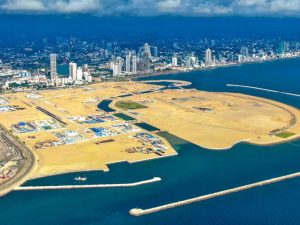In the video from two months ago, the former prime minister can be seen telling investors in Dubai that he wanted to “correct misapprehensions” about the project and quoting from a Chinese-funded study in support of the development.
Lord Cameron, now the foreign secretary, has been under pressure over his paid speeches to drum up support for the Sri Lankan port city, which is being built by a Chinese state firm, China Harbour Engineering Company.
He has claimed not to have engaged with the Chinese firm in relation to the speeches, and his spokesperson has said he was hired by KPMG Sri Lanka.
Pat McFadden, the shadow Cabinet Office minister, asked in parliament on Thursday whether the Chinese state firm or the Sri Lankan government were ultimately the client behind the payment.
John Glen, the government minister responding for the Cabinet Office, said it was not a matter for him to answer but that Cameron has complied with the relevant processes.
Kirsty Blackman, an SNP MP, told parliament that the “perception of Lord Cameron being put into this role [as foreign secretary] having clearly been lobbying on behalf of hostile foreign interests does nothing for the perception of politicians as being trustworthy”.
The footage of the event shows Cameron citing a glowing PwC report commissioned by the Chinese state company to make the case in favour of the project. “The PWC study shows it could create over 200,000 jobs, it could make a substantial contribution to Sri Lankan GDP,” he told the Dubai audience.
A note at the bottom of the report says CHEC Port City (Private) Ltd is the client and that the report “relied on information provided by the client”.
In the video, Cameron said it was “very good to be here this evening in Dubai to talk about the opportunities for people to invest” in the port, and that he was there to “correct misapprehensions” about its ownership. He stressed that Sri Lanka was the ultimate owner and the Chinese company had only leased part of the land.
The Chinese company has a 99-year lease on two-thirds of the new city, which has fuelled fears from critics that Beijing could use Sri Lanka as a military base for docking naval ships. The firm is ultimately owned by the Chinese state, through a company blacklisted in the US for militarising areas of the South China Sea.
Cameron has not disclosed how much he was given for the speeches via the Washington Speakers’ Bureau. His spokesperson told the Observer that they did not recognise Sri Lankan media reports that he was paid $210,000.
Last week the spokesperson told Politico, which first reported on Cameron’s involvement in the project: “Mr Cameron has not engaged in any way with China or any Chinese company about these speaking events.”
The Times and Sunday Times reported last week that Cameron had in fact been on a tour of the port city last January with Yang Lu, an executive at CHEC, who presented him with a souvenir of sand from the reclaimed harbour. The visit was arranged by Nirj Deva, a former Conservative MEP who is an adviser to the government of Sri Lanka.

Cameron’s pitch to Dubai investors was made as part of a conversation event with Deva, with a second event taking place in Abu Dhabi.
In the chat, he said: “I think it’s very good to be here this evening in Dubai to talk about the opportunities for people to invest in it, and as you and I hope, that this will be part of the ongoing Sri Lankan success story after what has been a very difficult decade.
“One of the things we can do today is correct misapprehensions about it. When you read the press about it you would think the whole thing is owned by China, run by China and governed by China and the Sri Lankans had made a terrible mistake. But when you actually look at the facts, the fact is it is owned by Sri Lanka and would be governed by rules made by Sri Lankans.”
Cameron has been approached for comment.
The foreign secretary is also under scrutiny after the Guardian revealed that HMRC was examining perks and payments he received while he lobbied for Greensill, the finance firm that collapsed amid scandal in 2021.
Glen, the Cabinet Office minister, was asked whether Cameron’s tax affairs had been taken into consideration when he was made a peer. The minister told MPs: “The ennoblement was approved by the House of Lords appointments commission in the usual way, and that included a check with His Majesty’s Revenue and Customs.”(Guardian )







